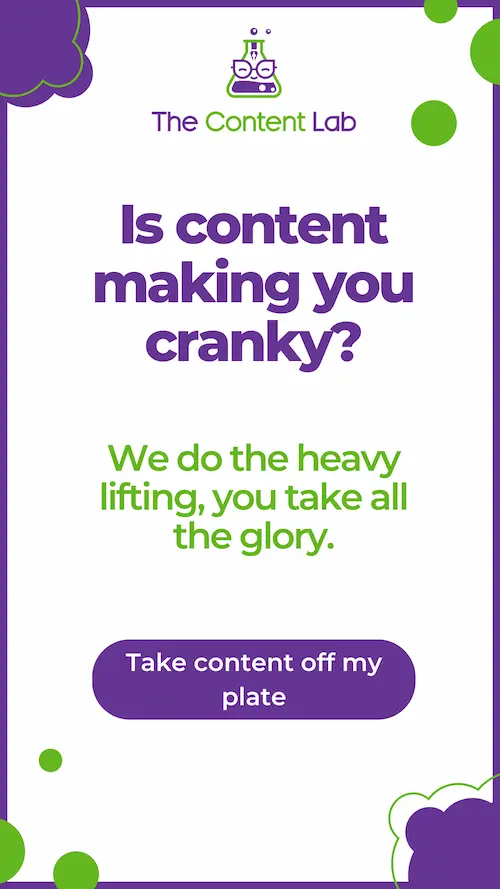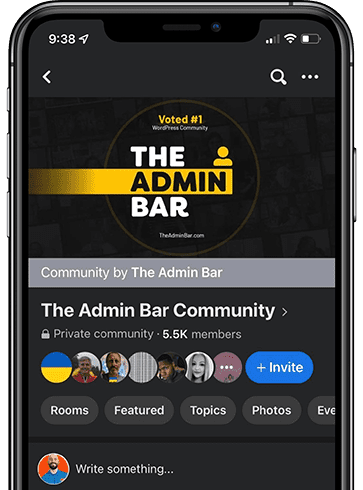Woooo you’ve got a new website project in!
After weeks (if not months) of talking, project scoping, and presentations, that great prospect has finally signed on the dotted line.
Maybe an old client has come back for another round of your amazing web design service and development skills.
It’s time to create a gorgeous website designed to attract, engage, and convert their target audience – and you couldn’t be more excited to get this show on the road.
There’s just one issue.
The copywriting.
You’ve looked at their current website, seen their social media, and glanced at that barren blog that hasn’t been updated since the site launched.
It’s not looking good.
Maybe your client doesn’t know what copywriting actually is? Or perhaps they’re under the impression that they can do it themselves (I mean how hard can it actually be to write an ‘about’ page, right?)
Maybe they’re happy with what they’ve already got – and they can’t see how anyone can improve on what’s already working for them.
You know better. I know better. Anyone that’s been left in waiting-on-website-content-limbo for 6+ months knows.
And after they’ve wasted 6 long months telling you they’ll definitely send it over next week (and we’ve all been there, there’s no shame here – in my early years of digital agency life, we waited A YEAR for a certain client to provide their copy, never again), you really don’t want the hassle of writing the copy yourself.
But how can you sell copywriting to a client that doesn’t really see the point of copy?
…and how can you make a profit off of outsourcing copywriting?
Well, today I’m going to go through everything you need to know about selling web copy to your clients.
I’m going to give you some tried, tested, and repeatedly-used responses for when a client objects to paying for professionally-written content… and then I’m going to show you how you can make a profit from outsourcing copywriting.
How to sell copywriting to your clients
When you’re trying to sell content to your client, remember that they’re just like any other consumer: they’re just somebody who’s trying to weigh up the cost/benefit of making a purchase.
They’re trying to decide whether or not this buying decision will benefit them and their company.
You already know your client’s content needs to be engaging, educational, relevant, and it has to make your clients look trustworthy… and it has to be written with conversion in mind. It also has to be written in a web-friendly format.
But your client probably doesn’t know the difference between good copywriting and bad copywriting.
So… show them!
Bring up a few examples of good and bad copywriting in their industry and show how it helps/hurts the companies involved.
Think about what problems a professional copywriter solves for your client. We’re not just talking about the actual copy.
An experienced copywriter will:
- Have a set process for researching, writing, editing, and delivering your client’s copy
- Complete thorough keyword research and competitor analysis
- Know how to write website copy that speaks directly to your client’s target audience
- Be able to represent your client in a positive light, making them the only choice for their prospects
- Differentiate your client from their competitors
- Be trained to write copy for SEO purposes, helping your client rank higher on search engines
- Complete the project within a set time frame
- Keep the overall web project on-time and in-budget
By showing them how your writer can help write content that will ultimately benefit their business, you’ll be able to successfully win them over and get them to purchase copywriting services from you.
How to sell copywriting services to different types of clients
Generally speaking, there are three types of clients that will be looking to buy content from you.
Depending on what type of client is working with you will heavily influence the most persuasive way to sell copywriting.
1. The online newbie client
This client may already have an existing client base, or they may be completely new to the business world.
Their current web presence:
- Is super basic (or they don’t have one)
- Doesn’t reflect their current business or where it’s going in the future
- Was mostly likely a DIY job
They’re looking to:
- Compete with established companies in their niche
- Create a reputation for their brand
Their barriers to buying copywriting:
- Budget
- “I can totally do it myself, this stuff looks easy”
- “My nephew took a scriptwriting course 3 years ago, I’ll just get him to write this for me”
You can sell to them by:
- Focusing on how your writer will create unique content that will establish a brand voice, establish a brand image, make their online presence more professional, and improve their SEO
- Educating them on the benefits of professional copy over DIY copywriting
2. The half-way there client
This type of client has a good bit of marketing and website copy already, and it kind of works, but it could definitely be better.
Their current web presence:
- Is a bit outdated
- Doesn’t reflect their current brand positioning/brand offering
- Was mostly likely mashed together over the years
They’re looking to:
- Update and upgrade their brand voice
- Improve conversion rates
- Nurture relationships with prospects/leads
Their barriers to buying copywriting:
- “Do I need to start from scratch again? That sounds like a pain in the butt.”
- “I have brand collateral and marketing materials already out there – there’s so many marketing materials to go through!”
- “I feel like I should be more involved in this process, but I just don’t have the time/patience to do this.”
You can sell to them by:
- Start with a content audit to know exactly what you’re dealing with, what can stay the same, what needs to change
- Providing a full content writing service, it’s mainly a hands-off experience for them – you (or your writer) are the expert they need to make this process painless and as quick as possible.
3. The been there, done that client
This last type of client already has a decent amount of copy already: ads, marketing, website, blogs, you name it. They also know a lot about copywriting, but they may not be very good at it, or inclined to do it themselves anymore.
Their current web presence:
- Is up-to-date, but not optimized
- A mixture of professionally-written and DIY copy
They’re looking to:
- Take their copy to the next level
- Improve conversion rates, increase their ROI
- Establish their authority in their niche
Their barriers to buying copywriting:
- “I’ve worked with writers before, some have been good, some have ghosted me, and some have been terrible. I want guaranteed success”
- “I’ve taken this as far as I can, I need an expert to take it to the next level”
- “I want to be part of the copywriting team/have creative input on the final copy”
- “I want to see measurable results after this investment”
You can sell to them by:
- Positioning your writer as an expert – someone they can trust to do this job the right way
- Set SMART goals with KPIs – show how you track and measure results
- Offer to have your writer optimize the client’s copy – this keeps them in the process, but makes sure the copy is written to achieve results
- Show them how you can improve their business, not just their website
Ok, so now you know how to sell to three of the most common types of copywriting clients – how the hell can you make a profit from it?
How to make a profit from outsourcing your copywriting
My number one tip for making a profit from outsourcing copywriting (or any other kind of outsourced deliverable for that matter) is to partner with a copywriter long-term.
Why?
Because when you’ve got a dedicated copywriter on-hand, whether that’s a freelancer, contractor, or a content agency, pricing a project is so much easier.
You can either get them to scope out a project for you and provide you with pricing, or you can get set pricing from them at the beginning of your relationship – it depends on how they work.
When you have a content partner, you know how much they charge – and how much you can charge on top of that.
Specialist white-label copywriters purposely charge a lower rate than most other digital agencies – so their partner agencies can make a profit off their deliverables.
Content as an add-on website deliverable
When pricing for a website project, always include copywriting in the project price. Don’t make it optionable. Content is so integral to a website’s success, making it optional is like making the actual web design optional.
Your clients are coming to you as the website expert – content, design, and development are all a part of the final parcel, and they’re coming to you to deliver the best of all three.
What to do when a client insists on doing their own copywriting
Sometimes, a client just won’t want to pay for copywriting for their website. Here are a few alternatives you can try:
- Offer to have your writer do the homepage copywriting for them and show them how to write the other pages themselves. This usually results in the client realizing how much of a pain in the butt it is to write it themselves, and how painless it was to get the writer to do the home page for them. Sometimes, they end up paying for the writer to complete the project anyway. If they write the rest of the site themselves, they’ll have a better understanding of SEO principles and formatting for your designs.
- Provide them with clear templates and instructions on how to write the text. This will (hopefully) prevent poor-quality content being handed in.
- Give the client a deadline to supply their text by. If they miss that deadline, they can pay for your writer to do it for them.
- Give the client a deadline to supply their text by. If they miss that deadline, you’ll get the copywriting completed and remove other scope out of the project to cover the cost. If you opt for this, make sure to communicate it clearly with your client before the project starts, or expect an almighty firestorm on your hands.
- Offer an editing/proofing service where your copywriter can go over their text and make sure the copy is up to standard. This is a great option for budget-conscious clients.
Just like selling a website solution, always sell copywriting to your clients based on what their individual, specific needs are.
I hope this gives you the confidence to pitch your next website project with copywriting included – your client’s conversions depend on it!
Let me know if you have any tips for overcoming the ‘I can just do it myself’ hurdle, I’d love to hear how you approach the copywriting conversation with your clients.






